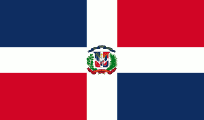INTELLECTUAL PROPERTY RIGHTS IN DOMINICAN REPUBLIC

Opposition Term |
45 Days |
Registration Term |
10 Years |
First Renewal Term |
10 Years |
Subsequent Renewal Term |
10 Years |
The legal framework for trademark registration is based on the Industrial Property Law 20-00 of May 8th, 2000, modified by the Law 424-06 of November 20, 2006.
Trademark registrations in the Dominican Republic are governed by the National Office for Industrial Property (ONAPI).
In the Dominican Republic, the exclusive rights to a trademark are granted only by registration, as it is a ‘first-to-file’ jurisdiction. However, in exceptional cases, well-known trademarks can be protected even if they have not been filed yet.
Dominican Republic follows the 10th edition of Nice Classification. Multi-class trademark applications are acceptable.
It is possible to file opposition actions against a trademark application in the Dominican Republic during a period of forty-five (45) days after its publication in the Official Bulletin.
In the Dominican Republic, registered trademarks have a validity of ten (10) years from the registration date. They can be further renewed indefinitely for successive periods of ten (10) years each.
The renewal request, which must include a declaration of use of the trademark, can be filed during the six (06) months preceding the expiration date, or during the six (06) months following it. Late renewal will incur additional costs.
It is not necessary for a trademark to be in use for it to be registered. However, once registered, it must not remain unused for periods of three (03) consecutive years, or it will become vulnerable to cancellation actions filed by third parties. The amount of use must be on a commercial scale to be acceptable. Partial cancellation is possible.
The Dominican Republic has been a Contracting Party to the Paris Convention for the Protection of Industrial Property since July 11, 1890. It has also been a Contracting Party to the Patent Cooperation Treaty (PCT) since May 28, 2007. In addition, it is a party to the Budapest Treaty on the International Recognition of the Deposit of Microorganisms for the Purposes of Patent Procedure.
Patent applications are filed with the National Office of Industrial Property, and the whole procedure might take about two (02) years.
In Dominican Republic, an invention that satisfies the conditions of originality, novelty, inventive step, and industrial applicability, subjects to patentability. Process patent and product patent are the two types of patents that can be protected.
Any interested person may present substantiated observations regarding the patentability of the invention, which is the subject of the application, detailing the relevant factual and legal bases. The filing of observations shall not suspend the processing of the application. The observation may be filed within sixty (60) days after the date of the publication.
ONAPI classifies patents for inventions in accordance with the Strasbourg Agreement Concerning the International Patent Classification of 1971, as amended in 1979.
Patents are also granted by ONAPI to protect utility models. Patents for utility models are granted for a period of fifteen (15) years from the application date.
Patents for inventions are granted for a period of twenty (20) years from the application date; with a possible extension of up to three (03) more years in case of unreasonable delay by ONAPI in the approval process.
Inventions, utility models, industrial designs, trademarks, trade names, signs, logos, geographical indications, and designations of origin are governed by Industrial Property Law 20-00 and its enabling regulations.
ONAPI classifies industrial designs according to the Locarno Agreement Establishing an International Classification for Industrial Designs of 1968, as amended in 1979.
The types of industrial design applications that can be filed in Dominican Republic include Non-Convention Application and Convention Application.
Following publication, any interested third party may, once only, file an opposition against the registration application within thirty (30) days of the publication thereof.
The time frame for issuance of the industrial design registration certificate is two (02) months.
The total duration of industrial design registration is fifteen (15) years from the date of application. The initial registration term is five (05) years, which is further extendible for two (02) terms of five (05) years each upon payment of the renewal fee.
The time frame for payment of the renewal fee before the due date is three (03) months.
Law 65-00 protects any original intellectual creation, whether literary, artistic, or scientific, that may be fixed, transmitted, or copied by any existing or future printing, reproduction, or divulgation methods. It also protects independent creations deriving from original works, such as those resulting from adapting, translating, or in any other manner transforming the original work. It also protects and regulates the exercise of, related rights, which are granted to performing artists for their performances, phonogram producers for their recordings, and broadcasters their radio and television programs.
The Dominican Republic is a party to and has ratified many international treaties related to intellectual property, including the Berne Convention for the Protection of Literary and Artistic Works, the Paris Convention for the Protection of Industrial Property, and the World Intellectual Property Organization treaties on copyright, patent rights, and performances and recordings.
Copyright registration is not mandatory for enjoying the protection of the law and this non-registration does not affect the exercise of the author’s rights arising from the material creation; however, it is strongly advised to register, and thus, reinforce by the publicity and guarantees of authenticity and security that ONDA provides for copyright protection.
In the absence of international treaties, protection will still be granted to foreign works, but subject to reciprocity.
Copyright shall accrue to the author during his lifetime and to his spouse, heirs, and successors in title for fifty (50) years after his death. In the case of duly established joint authorship, the period of fifty (50) years shall commence from the death of the last joint author.

